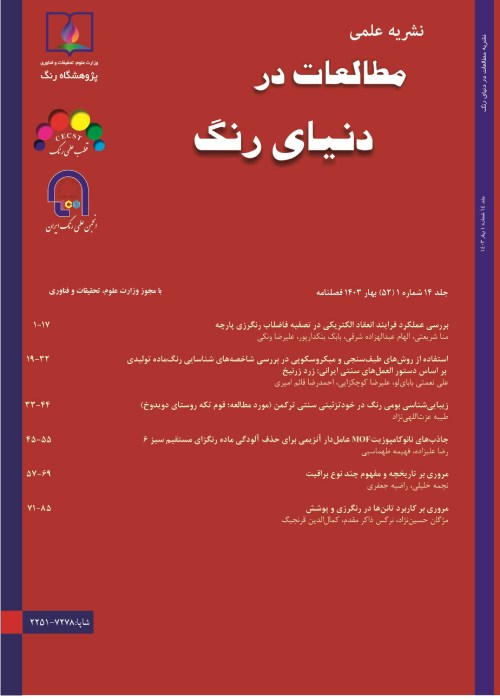Investigation of Environmental Problems Caused by Dyeing Effluent with Natural Dyes
Author(s):
Article Type:
Research/Original Article (دارای رتبه معتبر)
Abstract:
One of the main and essential problems in the dyeing units of the textile industry is the volume of pollutants produced, which has endangered the health of the environment through ground water pollution. Despite not causing respiratory and skin allergies and good compatibility with humans and nature, natural dyes can cause environmental problems by creating effluents. The resulting dyeing effluents often contain metal ions and colored compounds that can be harmful to the health of organisms and cause various diseases. Usually, different natural dyes such as madder, weld, walnut shell, and cochineal are used with different concentrations during the dyeing process. Besides, along with pre, simultaneous and post-mordanting methods, various mordants such as aluminum sulfate, copper sulfate, and potassium dichromate are applied. In this research, a review study has been conducted on the effect of using these dyes, types of applied mordant, and different dyeing methods on parameters such as BOD, COD, and TDS of resulted effluents.
Keywords:
Language:
Persian
Published:
Journal of studies in color world, Volume:11 Issue: 2, 2021
Pages:
53 to 62
magiran.com/p2318471
دانلود و مطالعه متن این مقاله با یکی از روشهای زیر امکان پذیر است:
اشتراک شخصی
با عضویت و پرداخت آنلاین حق اشتراک یکساله به مبلغ 1,390,000ريال میتوانید 70 عنوان مطلب دانلود کنید!
اشتراک سازمانی
به کتابخانه دانشگاه یا محل کار خود پیشنهاد کنید تا اشتراک سازمانی این پایگاه را برای دسترسی نامحدود همه کاربران به متن مطالب تهیه نمایند!
توجه!
- حق عضویت دریافتی صرف حمایت از نشریات عضو و نگهداری، تکمیل و توسعه مگیران میشود.
- پرداخت حق اشتراک و دانلود مقالات اجازه بازنشر آن در سایر رسانههای چاپی و دیجیتال را به کاربر نمیدهد.
In order to view content subscription is required
Personal subscription
Subscribe magiran.com for 70 € euros via PayPal and download 70 articles during a year.
Organization subscription
Please contact us to subscribe your university or library for unlimited access!



